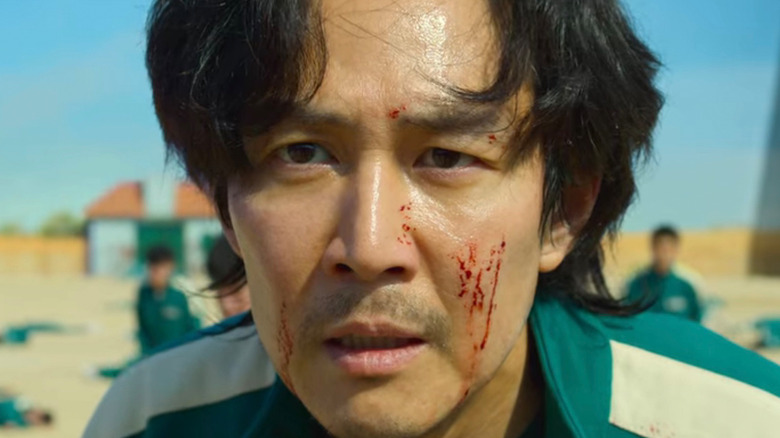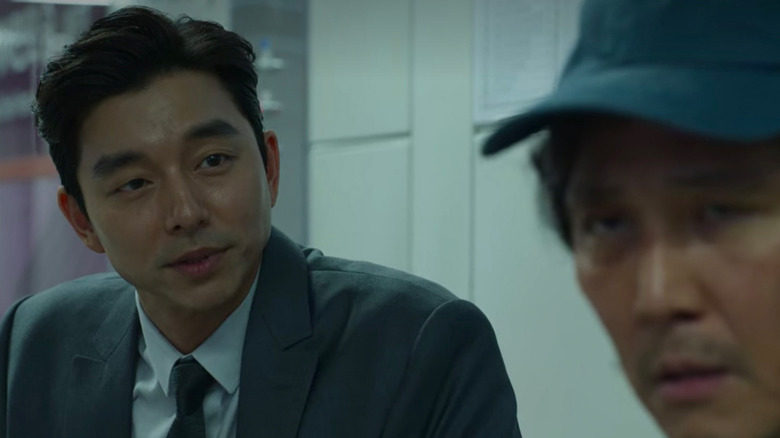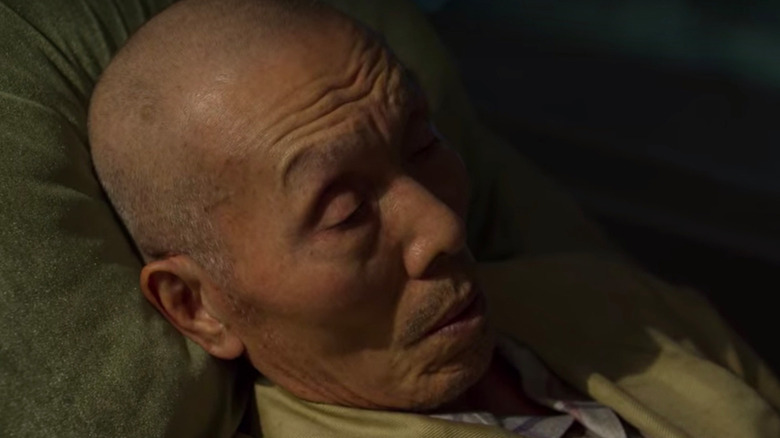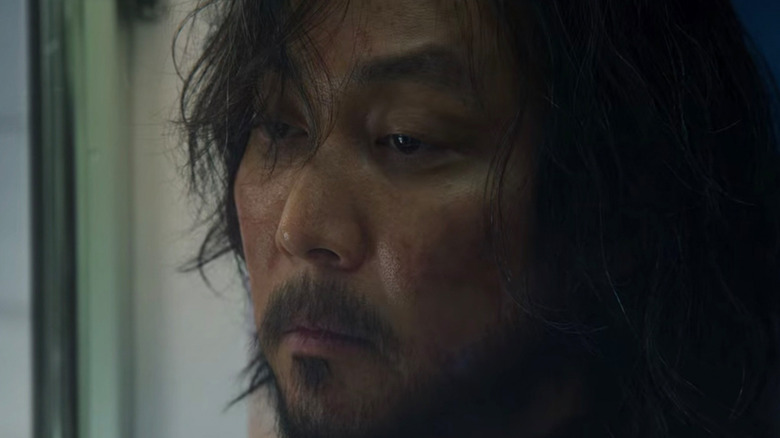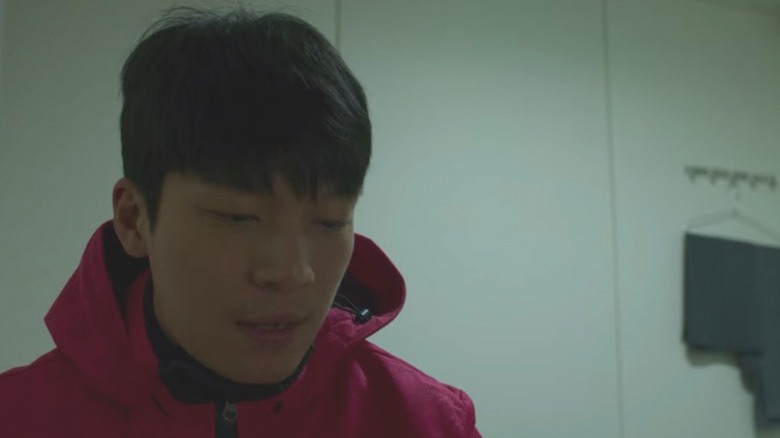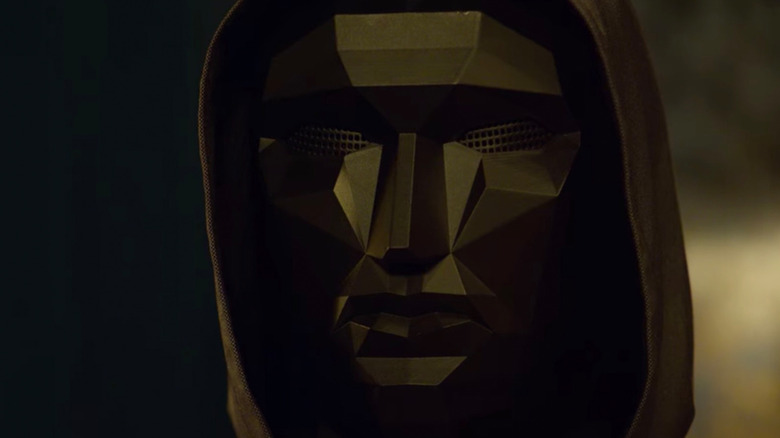Things About Netflix's Squid Game That Make Absolutely No Sense
"Squid Game" is the dystopian K-drama survival thriller that came out of nowhere to become not just one of the biggest shows of 2021, but perhaps Netflix's biggest show of all time if the current viewership numbers hold up (via Deadline). If you've somehow avoided hearing anything about it, "Squid Game" is about 456 down-on-their-luck people who voluntarily join a series of life-or-death children's games, all for the entertainment of the wealthy. On one level, it's a fun, escapist thriller full of twists and violence. But it's also very much an "allegory or fable about modern capitalist society," according to creator and director Hwang Dong-hyuk (via Netflix).
Enjoying almost any series requires some suspension of disbelief, but that's even more true with a show like "Squid Game." As we all remember from English class, allegories have both literal meanings as well as symbolic ones. Expecting "Squid Game" to be 100% logical is a pretty good way to ruin the fun. But even so, there are some moments in "Squid Game" that flat-out don't make sense, even when you account for the allegory factor. Here are six moments from Season 1 that left us scratching our heads.
The Squid Game is somehow a secret
It goes without saying that conducting brutal and deadly games is a no-no, legally speaking. And throughout Season 1, "Squid Game" goes to great lengths to explain how the games' organizers keep things secret. For one, the event is held on a remote island. Almost everyone involved with the game's operation wears a mask, from the VIPs down to the common workers, keeping them anonymous. And almost all of the contestants wind up dead.
The show also makes it clear that the event's organizers are society's elites, who have close relationships with politicians and law enforcement — the Front Man (Lee Byung-hun) who runs them has a younger brother who's a cop, for example. Presumably, at least some portion of the South Korean government knows about the games and looks the other way. And the VIPs certainly have enough money to bribe anyone who might object.
But even when you take all of those factors into account, it's still extremely unlikely that the games would have been so secret for so long. Thousands of people have been involved in running the games, from the construction workers who built the sprawling island complex with all of its death traps to the workers and guards in the present day. Contest winners are even allowed to return to society and resume their lives. The main character of Season 1, Gi-hun (Lee Jung-jae), who wins the contest, is the first person we know of who objects to the games and vows to expose its secrets. Are we really supposed to believe that he's the first person among all those winners who had a conscience?
The game's creators break their own rules constantly
All of the children's games featured in "Squid Game" are deadly. But they're also fair — or at least they're supposed to be. As Gi-hun discovers when he agrees to participate, the event's organizers have attempted to create a level playing field. No contestant is supposed to have an advantage over any of the others.
But it quickly becomes clear that this isn't the case. Contestants can smuggle weapons onto the islands with relative ease, and they aren't punished for using them. In one case, the game's organizers take their quest for fairness too far by depriving one particular contestant of his natural advantage. This happens during the penultimate game, where contestants have to crawl across a bridge made of glass without knowing which panels can support their weight. The contest's organizers suddenly turn off the lights to the detriment of Player No. 017, who's a glass manufacturer and therefore can tell the difference between tempered and regular glass. The VIPs even allow one of their own, Oh Il-nam (Oh Young-soo), to participate — more on him below.
On an allegorical level, it makes sense that the games would claim to be fair and really not be — capitalism is supposed to be a system that gives everyone a fair shot, but in practice it rarely does. But it's never made clear whether the contest's organizers are aware of their own hypocrisy, or if they are and just don't care.
Was Il-nam actually in danger or not?
During the course of the games, Gi-hun befriends an elderly man with a terminal brain tumor known as Player No. 001; he later reveals his name as Oh Il-nam. Eventually, Gi-hun discovers that Il-nam is actually one of the VIPs. Having grown bored after years of watching the games, Il-nam has decided to participate in them. Supposedly, Il-nam is competing fairly among all the other contestants. But when he "loses" the marble game in Episode 6, the contest's organizers whisk him away to safety.
This brings up all sorts of questions. How were the contest's organizers able to keep Il-nam alive as long as they did? He easily could have fallen to his death during the tug-of-war game, for example. As for Il-nam, he clearly knew that he wasn't a genuine participant in the games because the organizers were protecting him (or at least trying to). If he knew he was never in danger, how does participating in the games give him the thrills he was looking for? Let's be honest: for Il-nam, the real thrill wasn't the danger, it was deceiving the contestants.
A broke Gi-hun goes an entire year without touching his prize money
At the beginning of Season 1, the show explains why Gi-hun agrees to participate in the games. Like many of the other contestants, he's in dire financial straits. He's working a menial job, he owes money to several loan sharks, and he can't afford to pay for his mother's life-saving surgery. When he wins the games, he receives the grand prize of 45.6 billion won, or about $38.4 million USD. But competing in the games has made Gi-hun disillusioned. One year after winning, he hasn't even touched the prize money.
This might be satisfying on a dramatic level, but it doesn't quite pass the logic test. After that one-year time jump, Gi-hun still doesn't have a job, and since he hasn't spent any of his winnings, presumably he's still deeply in debt. Somehow, being in debt was enough of a problem to make him agree to play the games, but one year later it's no longer an issue. Convenient.
Jun-ho infiltrates the island way too easily
One of the subplots in Season 1 involves a police officer named Jun-ho (Wi Ha-joon). At the beginning of the season, he's trying to locate his missing brother, who disappeared years prior after taking part in the games.
Supposedly, security for the games is ultra-tight, and the games' guards have to follow stringent protocols. They're not even allowed to speak unless spoken to. Like the contestants, the guards are monitored at all times by security cameras. They're also microchipped and regularly subjected to facial scans through their masks. Finally, any mistake is immediately punishable by death.
And yet Jun-ho manages to infiltrate the island without much trouble. All he has to do is sneak onto a ferry, knock out one of the guards, and take their uniform. He breaks the "don't speak unless spoken to" rule, but he simply explains that he's new and doesn't understand the rules and the guard is satisfied. He's scanned multiple times, passing all of them. At one point, he even takes off his mask in his dorm room to eat. This happens in full view of security cameras, but nobody notices.
Sure, it probably wouldn't have been satisfying if Jun-ho had been executed the moment he stepped onto the ferry. But since "Squid Game" went to such great lengths to explain how impregnable the island is, this one stands out.
How did a former contestant become the Front Man?
One of the main villains in Season 1 is the Front Man, the enigmatic organizer of the games identifiable by his polygonal black mask. Eventually, it's revealed that not only is the Front Man Jun-ho's brother, In-ho, he's also a former winner of the games.
This brings up even more questions. As a survivor of the games, In-ho has seen more than his fair share of violence and death. So, why would he want to switch sides and work for the people who caused it? To be fair, Hwang Dong-hyuk did say that if "Squid Game" does get a season 2, In-ho might be a major focus. Presumably, Season 2 would fill in some of In-ho's backstory and explain his motivations.
But the bigger question is, why would the VIPs who own the games sign off on this? The on-site manager is a position of major responsibility, someone who has to ensure both the security of the events as well as the safety of the VIPs themselves. Putting a former contestant in that role — after he just survived a game that's inherently exploitative and unfair — requires a huge leap of faith that In-ho wouldn't turn around and seek revenge.
Then again, "Squid Game" is one big allegory for how broken capitalism is. If the games themselves were run logically and efficiently, it would undermine the whole point of the show.
